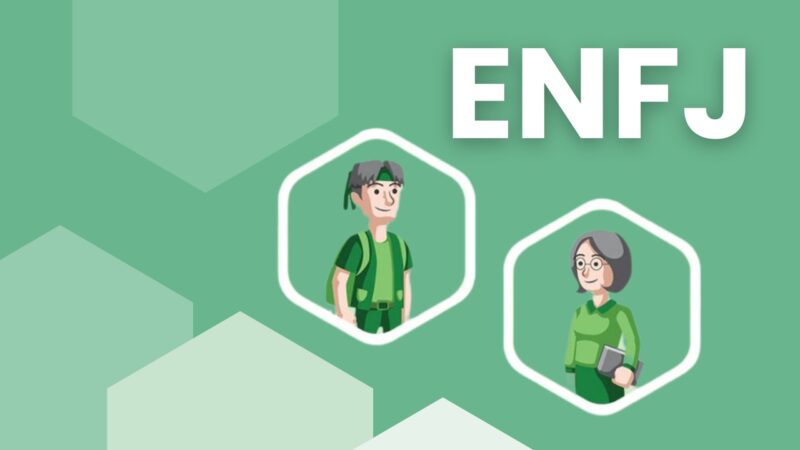In the realm of personality types, one of the classifications that captures attention is the ENFJ, also known as the “Protagonist” or the “Giver.” Understanding personality types can be a helpful tool in appreciating the variety of ways in which humans operate in the world.
This article aims to delve into the intricacies of the ENFJ personality type, focusing on their key characteristics, strengths, weaknesses, relationships, and optimal career paths.
The Myers-Briggs Type Indicator
Before we delve into the specifics of the ENFJ personality type, it’s essential to give a brief background on the classification system they come from: the Myers-Briggs Type Indicator (MBTI). The MBTI, developed by Katherine Cook Briggs and her daughter Isabel Briggs Myers, is a popular tool used in psychology to measure and categorize people’s personality traits. It’s based on the typological theory proposed by Carl Gustav Jung, a renowned Swiss psychiatrist and psychoanalyst.
The MBTI assesses personality types along four dichotomous pairs of cognitive functions: Extraversion/Introversion, Sensing/Intuition, Thinking/Feeling, and Judging/Perceiving. This system creates 16 unique personality types represented by four-letter acronyms. Now, let’s dive into the world of the ENFJ.
The Four Letters: E-N-F-J
ENFJ stands for Extraverted, Intuitive, Feeling, and Judging. This combination lends a certain unique dynamic to this personality type. Here’s a look at what each of these dimensions mean.
- Extraversion: ENFJs are outgoing and social. They gain energy from interaction and are typically expressive and enthusiastic.
- Intuition: This suggests that ENFJs favor a focus on abstract ideas and concepts, rather than concrete facts and details. They tend to look at the big picture and think about the future.
- Feeling: ENFJs prioritize emotions and values in their decision-making processes, often placing more weight on personal considerations than objective criteria.
- Judging: This does not mean judgmental. Instead, it signifies that ENFJs prefer structure and organization. They like to plan ahead and know what to expect.
These four traits together make up the ENFJ personality type. Now that we understand what each letter signifies, let’s delve into the traits that are typically associated with this personality type.
Key Characteristics of ENFJs
ENFJs are natural-born leaders, altruistic, and driven by a deep sense of empathy and idealism. They have an extraordinary ability to understand others and use their intuition and emotional intelligence to create strong, meaningful relationships. Here’s a more detailed look at their key characteristics:
- Empathetic and Caring: ENFJs are deeply empathetic, often sensing and understanding other’s feelings without the need for explicit communication. They have a knack for providing comfort, and they genuinely care about the well-being of others.
- Excellent Communicators: As extraverts, ENFJs are comfortable expressing themselves and enjoy engaging in conversations. They can articulate their thoughts and feelings clearly, making them persuasive communicators.
- Organized and Responsible: ENFJs prefer orderliness. They like to plan, schedule, and have control over their environment. They are also responsible, often taking charge in ensuring tasks get done.
- Idealistic and Visionary: ENFJs often see the potential in other people and situations. They believe in the possibility of improvement and are driven by their values and principles.
- Leadership Oriented: ENFJs have a natural tendency to assume leadership roles. Their charisma, combined with their vision and exceptional communication skills, make them effective leaders.
The Strengths and Weaknesses of ENFJs
Like any other personality type, ENFJs have their strengths and weaknesses, which can impact their personal and professional lives.
Strengths
- Strong Interpersonal Skills: ENFJs are great at building rapport, understanding others, and forming meaningful and lasting relationships. They are cooperative and work well in team settings.
- Leadership Abilities: Their charisma, vision, and excellent communication skills often drive them into leadership roles, where they excel at inspiring and guiding others.
- Determined and Passionate: Once an ENFJ believes in a cause, they pursue it passionately and with determination, often inspiring others with their enthusiasm and drive.
- Organized and Reliable: ENFJs are not only good at planning and organizing, but they also follow through on their commitments, making them very reliable.
Weaknesses
- Overly Idealistic: ENFJs can be overly idealistic, which may lead to disappointment when reality does not match their expectations.
- Struggle to Make Tough Decisions: Given their empathetic nature, ENFJs often find it challenging to make tough decisions that might hurt others.
- Overly Sensitive: ENFJs can be overly sensitive to criticism and conflict, which might make them defensive or hurt their feelings.
- Tendency to Neglect Self: ENFJs’ focus on others might lead to self-neglect. They might overlook their needs, leading to stress and burnout.
ENFJs in Relationships

ENFJs are natural nurturers in relationships, whether romantic, familial, or platonic. Their primary focus is on ensuring the happiness and satisfaction of those they care about.
In romantic relationships, ENFJs are supportive partners who aim to understand and fulfill their partners’ needs. They prefer long-term relationships and work hard to resolve conflicts and maintain harmony.
As friends, ENFJs are reliable and loyal. They are typically the glue that holds a group together, often playing the role of the organizer or the counselor within their circle.
In family relationships, ENFJs are nurturing and caring. As parents, they strive to provide their children with a sense of purpose and direction, encouraging them to develop into well-rounded individuals.
Career Paths for ENFJs
ENFJs flourish in careers that allow them to fulfill their natural desire to help others grow and develop. They often find satisfaction in fields like psychology, counseling, teaching, social work, and leadership roles in various sectors.
Their excellent interpersonal skills make them effective in human resources and public relations roles. Their organizational skills and their ability to inspire make them excellent project managers. With their intuitive understanding of others’ feelings, they can excel as counselors or social workers.
Moreover, their vision and communication skills equip them to be inspiring teachers, capable of nurturing their students’ potential. In the corporate world, their leadership skills make them effective managers or executives.
FAQs

What makes ENFJ a unique personality type?
A: ENFJs are unique in their combination of being outgoing and socially oriented (Extraverted), intuitive in their focus on ideas and concepts, driven by empathy and personal values in their decision-making (Feeling), and preference for structure and organization (Judging). They are often seen as charismatic leaders, known for their empathy, idealism, and exceptional communication skills.
Are all ENFJs natural leaders?
A: While it’s not accurate to say that all ENFJs are natural leaders, many of them are drawn to leadership roles due to their charisma, vision, and excellent communication skills. They often have a knack for understanding and connecting with people, inspiring others, and coordinating group efforts, which are crucial traits in leadership.
What are some potential weaknesses of the ENFJ personality type?
A: ENFJs may sometimes be overly idealistic, setting high expectations that may lead to disappointment if they’re not met. They might also struggle with making tough decisions that might hurt others, due to their empathetic nature. ENFJs can be overly sensitive to criticism and conflict, and they might tend to neglect their needs, focusing excessively on the well-being of others.
What careers are ENFJs usually good at?
ENFJs often excel in careers that allow them to help others grow and develop. They thrive in fields like psychology, counseling, teaching, and social work. They can also be effective in leadership roles in various sectors, human resources, public relations, and project management.
How do ENFJs act in relationships?
ENFJs are natural nurturers in relationships. They are supportive, understanding, and aim to fulfill their partners’ needs in romantic relationships. They are reliable and loyal friends, and in family relationships, they are nurturing and caring, often providing a sense of purpose and direction.
How can understanding the ENFJ personality type benefit me?
Understanding the ENFJ personality type, whether it’s your type or someone you know, can lead to better self-awareness and improved interpersonal relationships. It can help you recognize and appreciate different approaches to life, communication styles, decision-making processes, and the diverse ways people interact with the world around them.
Conclusion
Understanding the dynamics of the ENFJ personality type provides valuable insights into their unique worldview and behaviors. Their extraverted, intuitive, feeling, and judging traits create a personality that is empathetic, visionary, and leadership-oriented. These individuals shine in roles that allow them to uplift others, whether it’s through counseling, teaching, or leading.
However, like all personality types, they come with their set of strengths and weaknesses. Their strong interpersonal skills, leadership abilities, and passionate drive are counterbalanced by their propensity to be overly idealistic, sensitive to criticism, and tendency to neglect self-care. Recognizing these characteristics can help ENFJs, and those around them, work towards harnessing their strengths and addressing their weaknesses.
In relationships, ENFJs are dedicated nurturers who prioritize the happiness and growth of their loved ones. And in the professional realm, they excel in roles that allow them to utilize their empathetic nature, organizational skills, and inspiring communication abilities.
In essence, the ENFJ personality type, as unique and dynamic as it is, adds a vibrant and compassionate color to the human personality spectrum. Understanding and appreciating this diversity is key to promoting empathy, cooperation, and harmony in our interactions with others.

